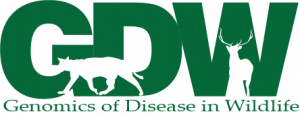Diverse and Talented GDW2017 Participants
In sharing the intensive GDW2017 experience, our 24 participants coalesced into a ‘think tank’ resource, working together and forming a new innovative network strengthened by their diverse expertise. All will be co-authors on a publication that will summarize ongoing issues and future directions featuring genomic solution for wildlife disease.
The GDW2017 workshop was limited to 24 participants, competitively selected by a 3-member committee from a highly qualified applicant pool, in order to facilitate an optimum learning experience using hands-on computer analyses of data from host and pathogen genomes. We welcomed international participants from Nepal, Ecuador, Canada, New Zealand, and Australia and researchers from across the United States. Overall, the GDW2017 participants (15 women and 9 men) included 11 faculty and other wildlife professionals; two post-docs, four PhD or DVM/PhD within one year of completing their program; and seven graduate students at various stages of completing their PhD or DVM/PhD programs. An additional eight auditors (senior graduate students and post-docs) were selected from a coalition of research groups linked with the NSF grant that was the basis for developing the workshop (National Science Foundation Award #1413925, PI Sue VandeWoude).


